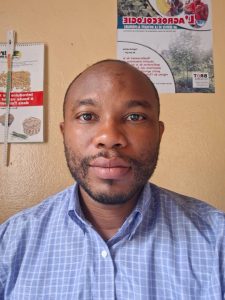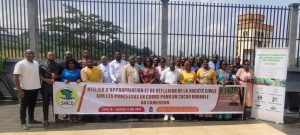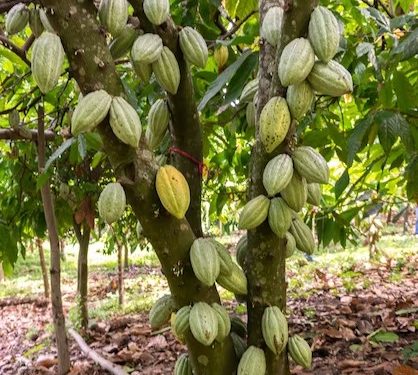Story, Louvier Kindo Tombe
As the deadline for the implementation of the EU’s deforestation-free cocoa concept narrows, civil society organizations in Cameroon are wondering on how the decision will impact smallholder cocoa farmers.
Most of them are still very ignorant of the regulation. That is why a non-for-profit NGO, Support Service for Local Initiatives, SAILD, organized a two day Civil Society Organization ownership and reflection workshop on sustainable cocoa ongoing processes in Cameroon. The idea was to see how smallholder farmers can better integrate the deforestation-free cocoa regulation.
According to all the facilitators at the workshop held in Yaounde, “it is essential and crucial for all the farmers to know that from December 2024 onwards, companies selling into the EU are required to only supply deforestation-free cocoa”.
In a document published by civil society organization, Green Development Advocate (GDA), the transition to deforestation-free cocoa standards will impact farmers negatively if appropriate measures are not taken by all the stakeholders involved.
“We will continue to cut the forest because there are currently no alternatives,” a farmer said to a researcher from GDA.
Most cocoa farmers fear that the new standards will affect their livelihoods by condemning them to poverty given that expanding new areas under cultivation is often seen as the only means of increasing their income.
With severe unemployment across the country, some young people are now turning to cocoa farming as a way of making a living, but the new standards is a big stumbling block to their vision.
The farmers argue that growing cocoa under the shades of forest trees should not be considered as deforestation with the EUDR framework.
One major concern raised during the field research was the idea of villages relocating following large agro-industrial activities ongoing in the country.
“When we are relocated to a new place, we will need to establish a new cocoa field as well, if the only land available is forest land, how will we be able to cultivate deforestation-free cocoa,” another farmer laments.
Way forward

The Yaounde workshop examined on one hand, the challenges of smallholder cocoa farmers and the regulations of the EU standards including steps taken by the government of Cameroon in that light.
“Urgent work is needed to clarify and communicate on the standards,” Guy Rodrigue Kouang, in charge of programmes at SAILD told this reporter.

“The government of Cameroon needs to step in and fully support smallholder cocoa farmers with skills, materials, and resources so that they can be able grow more cocoa on less land,” says SONKOUE TCHIADZE Gerardine, Executive Director of SONAPROCAM.

Cemeroon’s cocoa production is predominantly agroforestry, and the complementary measures that support the implementation of the standards, however, can and should support best agroforestry cocoa cultivation on existing agricultural land.
“Definitions of best practices should be tailored to particular ecological contexts,” say Aristide CHACGOM, Coordinator of Green Development Advocate.

Place of cocoa in Cameroon’s economy
In Cameroon, cocoa production is intimately connected with the lives of hundreds of thousands of people, and the national economy.
Around half a million Cameroonian households earn a living from the cocoa sector, with most being small scale farmers.
Most productions are concentrated in the South West and Centre regions amounting to about 80 percent.
Cocoa is Cameroon’s second most important export, after petroleum, although it only contributes around 1.2 percent to the country’s GDP, and delivers around €45 million in taxes each year.

Current annual exports hover around 300,000 tonnes, and there is a long standing government target to double it to 600,000 tonnes.








